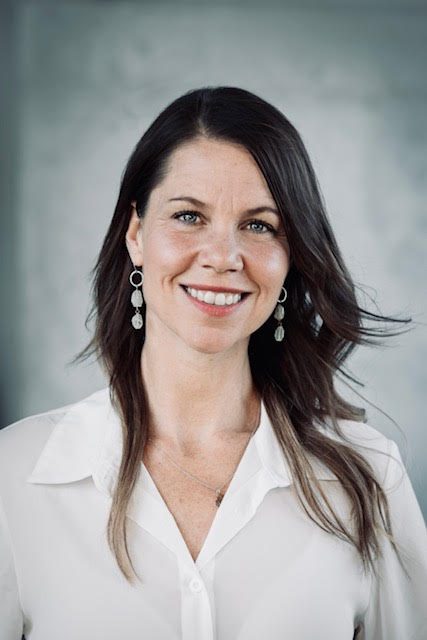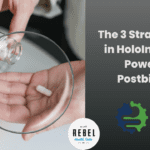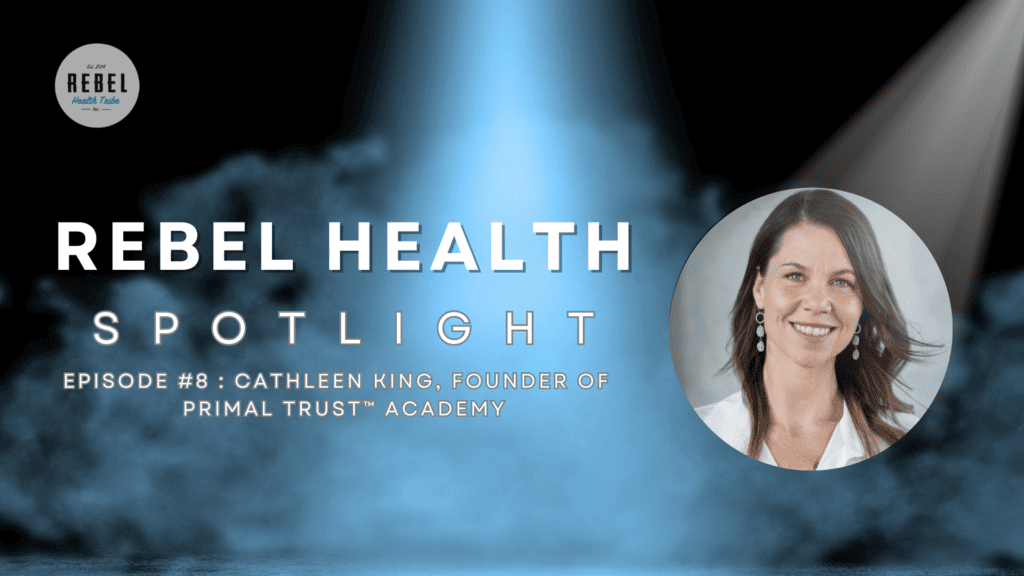
Play Video
Rebel Health Tribe Spotlight – Episode 8: Dr. Cathleen King, DPT
For additional information on Dr. Cathleen King, check out these resources:
www.primaltrust.org
Instagram: @primaltrust_official
Youtube:@primaltrustofficial
Facebook: @primaltrust.drcat

Dr. Cathleen King, DPT
About our Guest
Dr. Cathleen King, DPT is a doctor of physical therapy who loves teaching neuroscience principles. She is an intuitive mind-body practitioner, mom, and the founder and CEO of the Primal Trust™ Academy & Community. Her superpower is helping people with chronic health conditions see the patterns that have bound them, help them regulate their nervous systems through a multifaceted brain-body approach, and create transformational life changes.
She found her own liberation from over a decade of debilitating chronic Lyme disease, mold illness, microbiome imbalance, CFS, PTSD and a host of other challenges that left her mainly bed-bound in a dark room. After unlocking her own healing through neuroplasticity based methods and own intuitive approach, she created the Primal Trust™ Academy & Community to combine the latest neuroscience education, wisdom from mind-body leaders, top-down brain retraining, and bottom-up somatic healing techniques to help others reclaim vibrant health.
Her program and style have the vibe of challenging the status quo, while also co-existing with other methodologies. Her courses interweave biomedical teaching, neuroscience, with both ancient and modern mind-body wisdom.
Webinar Transcript
Michael Roesslein:
And we’re live with another episode of Rebel Health Spotlight. I’m Michael, your host. I am joined today by my friend, Dr. Cat. Cathleen King, thanks for being here.
Dr. Cathleen King:
Thank you. Thank you for having me.
Michael Roesslein:
Yeah, it’s going to be fun. I always enjoy any time that we get to connect. So your story, like many in this field, a lot of people get into what they’re doing because they had to, kind of in a sense. So I’m not going to spill the beans or go too much into it. I want you to tell people a little bit about yourself and your story and what you do and your platform and all that. So let’s start at the beginning and we’ll get to the present.
Dr. Cathleen King:
Okay, sure. Why I do what I do or …?
Michael Roesslein:
A little about your story, how you became Dr. Cat.
Dr. Cathleen King:
Yeah. Well, I grew up in a situation where I was desperately trying to be better than my family and be nothing like them. So I’m going to say it that way, because I became that overachieving, go, go, go. I’m going to defeat the odds and get out of this little town and become something. Become something to avoid how crappy I felt inside. So not only was I the first one to graduate high school as valedictorian, I became a doctor and I did the opposite of the family line. And this is so important. I became a doctor of physical therapy and I had high hopes of being able to help the world and do all sorts of things as far as that route.
And I got sick, which was totally predicted by the childhood ACEs study that if you have a certain amount of trauma, eventually you end up often sick. I had that nine out of 10 ACEs score, high achieving perfectionist that ended up sick. And so I had these skills as a physical therapist, a lot of mind body medicine training, but now I was on my own journey to help myself. And I had all sorts of things like Lyme disease, mold toxicity, parasites, viral infection. And it really took me out. I wasn’t even able to work.
Michael Roesslein:
So you’re an overachiever in chronic disease as well. [inaudible 00:02:36].
Dr. Cathleen King:
Yeah, I really liked to do it all. And-
Michael Roesslein:
Hold on. Before we go further, can you share just a little bit about the ACEs study and what that is? I think a lot of people know, but I want to make sure everybody understands what that means.
Dr. Cathleen King:
Well, you can Google it. It would be the Kaiser Permanente Childhood ACEs test, and you can take it. It’s 10 questions and depending on how many questions out of 10 you answer yes to, it’s a predictor of chronic illness later in life. And so it’s a really simple test. And I remember when I took it, I thought I grew up in a normal, well, I grew up in northern Michigan and a lot of people had a lot of dysfunction. And I thought, well, yeah, it was a little worse than others. And the test result was, yeah, nine out of 10. And that’s a high indicator. I mean, four out of 10 is a high indicator of having some type of chronic illness. And so it’s a way of maybe getting a prediction that working on your nervous system and working on healing your trauma patterns and family of origin issues, might be in your best interest to avoid some type of long-term health challenge.
Michael Roesslein:
Yeah. It’s really incredible. I still remember the first time I was presented with that information. I was at a conference and I saw a woman named Niki Gratrix give a presentation about the ACEs study and about if you score here, you’re this many times more likely to have addiction. If you score here, you’re this many times more likely to commit suicide. If you score here … And the numbers, and it wasn’t small numbers, it was six times, 10 times, 12 times, 80% more. And I was sitting there and I had been in this field of functional medicine and nutrition and for maybe five years at the time, maybe a little longer, and I’d never heard of this.
And everyone knows smoking is bad and everyone knows that if you drink tons of alcohol or do lots of drugs every day, you’re probably going to get sick. And there’s these things that everyone, even people who aren’t trained in anything, look at and say, “That is not good for me to do that,” or “This puts me at a higher risk of disease.” And your score on the ACEs, higher scores on that, dwarf the outcomes of a smoker or plus also to be a smoker, it increases the risk exponentially. So there you go.
But I was like, this is irrefutable huge. Why is this the only presentation at this conference that’s about this topic, and why are there only 30 people in this room when there’s 500 in the room over there talking about the ketogenic diet? What am I missing? And that’s when my wheels started turning with that kind of work, was like, everyone’s missing the boat on this. So I don’t want to go on a crazy rant, but it blew me away, the number. So everybody go look that up and check it out, and you’ll also be blown away.
So you escaped. You were a valedictorian, so you really bucked the trend. And then you got sick once you became a doctor of physical therapy. So I think that’s where I cut you off if you’d like to continue there.
Dr. Cathleen King:
And I spent many years in the both Western and functional medicine route trying to fix myself. Literally well over a decade, taking God knows how many supplements, medications, et cetera. I couldn’t get better. And eventually I started to connect the dots. Because I did understand chronic pain and trauma, but I didn’t relate it to me chronic infection and mold toxicity and parasites. And I thought, what if trauma in my nervous system is running the show again? And I started to really look into it, and sure enough, I started finding evidence that people with Lyme and mold and parasites and ongoing infections are stuck in what’s known as a cell danger response, which is your cells are literally on red alert because they’ve been that way since you were a child. And so their capacity of recognizing infections is reduced. The capacity to appropriately detoxify is reduced.
And it’s just that you’ve gotten stuck in a habituated sympathetic nervous system overdrive, or simply put, a chronic stress response that’s now become normal. It was normal for me to work hard, achieve hard, go, go, go, but it was the same thing as me running around screaming like a tiger was chasing me. It literally is the same physiology. And when I had to look that in the eye and be like, that’s what’s going on. This is actually what’s going on. I am stuck in a chronic stress response and no pill and no doctor can fix this for me, and I have to go on a different journey. And that’s what led me to do what I do today.
Michael Roesslein:
Which is, I don’t want to speak incorrectly about it, but you have a platform Primal Trust, and we’ve referred many people there. It’s a really cool program and platform and community. So if you could just share a little bit about what it is and how it works and then where people find it.
For me, it’s my kind of go-to referral. If somebody says, I’ve tried all this, I’ve gone to this doctor, I’ve tried these supplements, because the nervous system work and the trauma work and getting your body to stop freaking out, I’ll use medical terms, is essential if you want to get into a healing state. So how would you describe what you’ve built there?
Dr. Cathleen King:
Primal Trust teaches you the tools of nervous system self-mastery. The tools that we should have learned in kindergarten in our culture: how to breathe, how to redirect our thoughts, how to work with our limbic system, how to recognize scared parts of us, how to recognize the way that we are operating in a chronic stress survival mechanism. So Primal Trust is a platform that’s very educational. So you’ll learn a lot of tools about nervous system health, brain retraining, somatics, vagus nerve toning, but we also go into trauma understanding so that people can become aware that they might have parts of them that are running their physiology, literally running their physiology, and when they’re so frustrated they’re not getting well, a part of them might have a reason for creating the symptoms that is being created. So you learn both self-mastery of the nervous system, but also trauma awareness, which really is, it’s a platform to teach the journey I had to go on to be able to move into a different paradigm of what chronic illness is and how to work with it.
And so I hope to be able to help others to be able to make that paradigm shift out of just dependency on functional medicine or Western medicine, and to find a more self-empowering way to work with their body. And it doesn’t mean that they don’t do medicine or supplements, I’m not against it, but there is something that we can do inside of ourself when we start learning how to self-regulate our own biology.
Michael Roesslein:
Yeah, thank you. And it’s the best of its kind that I’ve seen. And I know that there’s some good neuro-retraining programs out there that are kind of stand alone neuro-retraining, like something like DNRS or Gupta. There’s these different programs that are simply the brain retraining or the limbic system retraining, but they don’t incorporate any other stuff into it. And so it’s like teaching one skill or one tool. And that works great for some people and also it doesn’t for some people, and they need some other approach. And so you’ve got it tiered for where people are at, a little bit too.
I get the emails, I see the levels, and that’s great because meeting people where they’re at with that stuff, because some people are so overwhelmed with their illness and how they feel, when you were at your peak of chronic disease achievement, we’ll call it, giving somebody like that a list of these 27 things you need to do starting tomorrow, is not probably what’s going to work. And so baby steps and little practices and something simple and all the way to more advanced stuff down the road, you’ve kind of tiered it.
Dr. Cathleen King:
Yeah. I started to realize what was working, what wasn’t, even brain retraining as great as it is, I don’t start with that right away anymore because I’ve seen that brain retraining can become a type of distraction mechanism away from trauma. And it’s beautiful in helping to downregulate the stress response. But if people haven’t developed the basic skills of just simple breath and simple vagal toning, I just saw that some things were happening that were counterproductive in their healing. So I’ve been very careful with an algorithm of nervous system retraining.
Michael Roesslein:
Cool. That’s interesting. I’d love to chat shop sometime about that. I’ve seen a lot of people go into that too that weren’t ready for it and it didn’t work out. And I’ve always kind of viewed it as a little bit of a avoidance or a dissociative kind of thing versus looking at why am I like this in the first place? Not how do I redirect into some other way of thinking, but why is the system like this in the first place? So we’ll put a link down below, but for the people that are listening, what’s the URL or how do they get there? How do they check it out?
Dr. Cathleen King:
Just primaltrust.org, primaltrust.org. And you can find a lot of free information on YouTube on our Instagram primaltrustofficial. I’ve got a lot of free stuff out there for people who are interested.
Michael Roesslein:
There’s a lot of content. And so the community, I mean, how many people are in your community now?
Dr. Cathleen King:
Actively? Currently we have over 1700, but I’ve taken almost 5,000 through in the last couple years.
Michael Roesslein:
Wow. So I remember something you said about 15 minutes ago, that when you became a doctor of physical therapy, you wanted to do something that would have an impact on a lot of people. And so I would say putting 5,000 people through this program is quite an impact. So bravo, it’s really important work. And that allows those people to go maybe back to that functional medicine doctor or back to that approach of that didn’t work, because there’s a reason things didn’t work for people and that they can’t… I’m looking at the diet, I’m looking at my lifestyle, I’m looking at this exercise stuff and something’s not right.
This is often the type of work that is the something that’s not right. And so it allows people to get their body into a state where all these other approaches that they may see people in their Facebook groups they’re in, or whatever, saying like, “Oh, I did this and I felt a million times better,” or “I worked with this doctor and then I am all better.”
And then they start to believe that they’re too broken or something’s wrong with them or they’re the problem. And this can get people from that state to a more receptive to healing kind of place. So I fully endorse it. I think it’s great. I am really excited about what you’ve built there. So the link will be down below to all of those, the Instagram and the website. And I’m curious if you could drop a few take-homes for people that are curious. We’ve just talked in general theory around some practices or something you can do. You mentioned the breath, you mentioned nervous system regulation or any of that. So if you could drop a couple of your go-to maybe beginner level practices that somebody could try tomorrow, that’s simple and easy to do, that might move the needle a little for them, what would that be?
Dr. Cathleen King:
Well, the number one thing to know is that when we start getting chronic symptoms, it can become almost a chronic identity. And one of the things, a journey that we need to go on, is to get out of this habituated mind focusing on our symptoms and trying to figure it out. Our mind starts to literally obsess like, oh my gosh, what is this? What do I need to take? What do I need to do? What’s wrong with me? Why am I sick? Oh, now it’s my digestion. Now it’s … It’s this crazy endless loop. And so the first thing I would say is to look for the elephant in the room. And what do I mean by the elephant in the room? Well, if you know that chronic symptoms are because of a chronic stress response, and we have a lot of science to prove that, where in your life is that chronic stress response coming from?
So instead of like, oh, my diet or this supplement or this and that, no. What is keeping you in disharmony, disease dysregulation, on a daily basis? Is it your partner? Is it your children? Is it your work? Is it your financial fear? And to first relabel like, okay, what is going on is that I am in this chronic stress response, and it’s no mystery because I’m constantly stressed about X. And so instead of having your focus be about the diet and the pills and all of that, look at what’s actually driving it and saying, okay, maybe I need to get a coach with my partner here, or maybe I need to get a financial advisor to help me with this, but I need to start tackling the elephant in the room rather than the symptoms. That’s huge. And the mind likes to tackle things that thinks it can control easier.
It doesn’t think it can fix the relationship. Because that’s usually where our original wounding is. It doesn’t think it can fix the out of control financial situation, but it’s like, oh, but this symptom here, this pain, this digestion, let’s just obsess over that and go from doctor to doctor and thing to thing and ignore the elephant in the room. So my first advice is look for the elephant and acknowledge it and be really truthful to yourself.
Because here’s the thing, your limbic system is driven, your limbic system is that emotional part of your brain that’s running your entire physiology. And the moment you name the truth about what’s causing stress, you get less stress in the system. Just by simply saying, I think I’ve got a chronic symptom, chronic illness, because I’m chronically stressed because I’m constantly rejecting this relationship, boom! Truth comes into your system and does something magical. And that alone can start to shift your symptoms just by acknowledging. So I haven’t even taught a tool, I’ve just reoriented you to look beyond illness, because there’s something there.
And then the second thing is you might have some symptoms to deal with in the moment. And before you learn all the tools and all the practices, it’s literally the willingness to just have that symptom be there and say, “You know what? You’re part of me and I’m part of you and you are here.” The reality is this symptom is here right now. And your symptoms always are a way to hear from your body and begin to say, “I want to listen. I don’t like what this feels like. I don’t like that it feels out of control, but I want to start listening to my body. And I’m willing to go on a journey to listen.”
And just starting to sit for one minute, 30 seconds, whatever, with that particular symptom and say, “I’m part of you. You’re part of me, and I’m not going to run away and I’m not going to let my mind try to solve this symptom.” Because that’s a distraction. There’s an old story here. The mind is going to be like, what? Oh, what is it? Is it IBS? Is it this food allergies? is it this? Is it this? No, I’m going to be with whatever the symptom is in your body. I’m pointing to my arm right now as if it’s in your arm, but I’m going to listen.
So I’m going to look for the elephant in the room and I’m going to acknowledge it. And secondly, I’m going to start sitting and saying, “I’m going to go on a journey to listen and universe bring to me whatever tool, resource, coach that’s going to help me be able to do that.” Because you’re probably going to need some help, but I’m willing to listen. So that’s where I’d start.
Michael Roesslein:
Those are great. I’ve done a lot of spiritual practice. I don’t know what to call it. I don’t like to use the word training when it comes to spirituality, but I’ve been taught by a lot of teachers in the last five years, various Buddhist lineages, and it’s always the resistance to what is that causes the suffering, not the thing itself. And I don’t mean to gaslight people that have symptoms that are painful and suck to have. It’s miserable, it’s difficult, it’s challenging, but your second thing there really reframes. You can’t heal something that you hate and are fighting. And so I try to avoid that terminology now, like the war on this or the fight against this or the whatever, especially when it comes to cancer, that’s not how it works. And so I love the reframing and those elephants in the room often aren’t what the people want to see.
When I used to work with clients, they’d come in, they want to run this $5,000 in labs and do these elaborate supplement protocols they heard about on a podcast, and they want to do this thing. And I’d be like, “What’s your situation at work like?” And they’d be like, “Oh, it’s really stressful. The company might close down. I hate the boss. He’s really abusive.” And it would go for a half hour, and then they’d go right back to the supplement questions. And I’m like, “What can you do about that job?” Because that’s their elephant. And so we do. We just go right over these things because we think we can’t do anything about it. And beautiful. Those are perfect. So thank you so much. And everybody rewind that and listen to those two again, if you’re suffering with some form of chronic disease and go check out her platform, I highly recommend if you hear yourself in what she’s talked about, that this is the place to go. So thank you so much, Dr. Cat, for what you’ve created there and what you’re doing and for doing this interview, I always really enjoy connecting.
Dr. Cathleen King:
Thank you. It’s always an honor to, and thank you for the work you do for the world as well.






